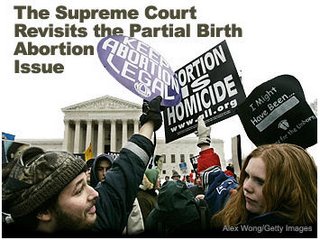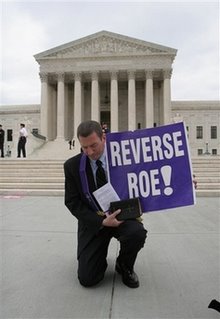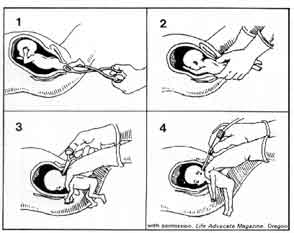…involves partially removing the fetus intact from a woman’s uterus, then crushing or cutting its skull to complete the abortion.
Not surprisingly, anti-abortion advocates hailed the ruling as a seminal, and perhaps pivotal, victory in their holy mission to roll back a woman’s right to an abortion, which was established with the Roe -v- Wade decision in 1973. And, true to form, pro-choice advocates condemned it as an egregious and unconscionable restriction on a woman’s ability to exercise this constitutionally-protected right.
As it happens, there’s merit in both praising and condemning this ruling. I’m acutely mindful, however, that even though it’s being played out in courts and legislatures all over America, the abortion debate is really a religious fight over whether it’s moral or not to abort a fetus under any circumstances. And frankly, who knows?
But this is hardly the forum for a dissertation on the morality or immorality of abortions. Instead, I shall suffice to reiterate, for the record, that I am unabashedly pro-choice. Beyond this, I refer you to the Related Article below in which I delineate a little more of my thinking on this very contentious issue.
That said, I feel obliged to note that had the court handed down this ruling last week, it would have commanded as much media coverage as is being dedicated this week to the shooting rampage at Virginia Tech.
 Nevertheless, the coincidence of these two events is instructive: Because on the one hand, that massacre is forcing conservatives (most of whom, ironically, are religious fundamentalists) to defend the untenable position of insisting on an individual’s unfettered right to possess any type of gun. And on the other, this ruling is forcing liberals (most of whom, ironically, are secular humanists) to defend the equally-untenable position of insisting on a woman’s unfettered right to any method of abortion…any time.
Nevertheless, the coincidence of these two events is instructive: Because on the one hand, that massacre is forcing conservatives (most of whom, ironically, are religious fundamentalists) to defend the untenable position of insisting on an individual’s unfettered right to possess any type of gun. And on the other, this ruling is forcing liberals (most of whom, ironically, are secular humanists) to defend the equally-untenable position of insisting on a woman’s unfettered right to any method of abortion…any time.
But just as I support restrictions on an individual’s right to possess guns – like assault weapons, I also support restrictions on a woman’s right to have abortions – like parental notification in the case of minors.
However, no one can deny that this ruling is a triumph of prevailing moral beliefs over sound judicial reasoning. After all, nothing else explains or justifies prohibiting a doctor from performing late-term abortions, or any procedure, that he or she deems is necessary to safeguard a woman’s health. Indeed, other than the patently-moral dictate of acting to “promote respect for life, including the life of the unborn”, the court offered no medical or logical reason for banning partial-birth abortions while permitting other “more acceptable” methods of late-term abortions, including the “dilation and evacuation” procedure.
 What is truly significant, however, is that the court’s rationalization of its ruling sets a clear precedent that it is predisposed to consider further restrictions on a woman’s right to an abortion. And all too many state legislatures are already disposed to passing laws to test this predisposition. Nevertheless, notwithstanding the fervent prayers of anti-abortion zealots, neither this court nor any in the foreseeable future will actually reverse Roe.
What is truly significant, however, is that the court’s rationalization of its ruling sets a clear precedent that it is predisposed to consider further restrictions on a woman’s right to an abortion. And all too many state legislatures are already disposed to passing laws to test this predisposition. Nevertheless, notwithstanding the fervent prayers of anti-abortion zealots, neither this court nor any in the foreseeable future will actually reverse Roe.
In fact, for a little perspective, consider this:
An estimated 1.3 million abortions are performed in the United States each year. But this ruling will affect no more than 5000 of them that are classified as partial-birth abortions. Therefore, no one can reasonably claim that banning them places an “undue burden” on a woman’s right to an abortion.
Accordingly, pro-choice advocates raising alarm over this ruling are rather like the pro-gun advocates who threatened (political) civil war when a federal ban on assault weapons was enacted in 1994. (Alas, to my dismay and their pyrrhic relief – this ban was lifted in 2004 when a sunset provision took effect.)
Related Articles:
My position on the abortion debate
Alito helps solidify conservative control of Supreme Court
abortion rights ban

Leave a Reply
You must be logged in to post a comment.